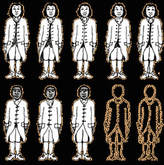weekly column
|
Each week, find a commentary on something connected to verses of Torah or another source of wisdom
|
|
Each week, find a commentary on something connected to verses of Torah or another source of wisdom
|
|
 The Exodus:5 Project And the Egyptians shall know that I am the LORD, when I stretch out My hand over Egypt and bring out the Israelites from their midst. Exodus 7:5 I had the great experience of spending some time with all my kids this past week. They live relatively close to us, but it has been a busy time for everyone and the chance to be together helped me appreciate what remarkable people they are. I like to tell people that their mother raised them well, and she always objects, saying it was a highly collaborative process. She is right, of course. I can have a pretty high opinion of myself. What brings me down to earth, however, is when I hear other people carry on about themselves. A good friend was telling me about a dining companion who described himself as a self-made man. He insisted that everything he accomplished, he accomplished on his own. He would not accept the suggestion that he had any kind of help – the buildings he built he built without anyone else’s assistance – not even the construction crews. He is wrong, of course. But he believes it. In his arrogance, he dismisses the skill and effort that assemble to ensure his success. It may very well be that, given enough time, he could have built his real estate collection from the ground up, digging foundations by hand, mixing the concrete with a wire whisk, dragging the steel beams from the forge after he let them cool, and so forth. It is nonsense. In this world, no accomplishment is the result of an individual’s effort. The spectacle that has afflicted the highest office in the land is an embarrassment. Yet another Twitter war has erupted, this one between the father of a college basketball player who was arrested in China for shoplifting and the President. The father was particularly ungracious after the Chinese government acceded to the request of the President to release the three young men rather than try them for the crime they committed. It is doubtful that anyone hearing his ingratitude would approve of his behavior. Out of his disdain for the man who holds the office, he declined to give thanks and assigned the return of his son to diplomatic efforts in different corners of the government. The President responded with unkind words of his own directed at the father. That much we have all come to expect. But like the aforementioned dinner companion, he added this: It wasn’t the White House, it wasn’t the State Department, it wasn’t father LaVar’s so-called people on the ground in China that got his son out of a long term prison sentence - IT WAS ME. “It was me.” In all capital letters, no less. It may very well be that, given enough time, he could have recreated the political and economic circumstances that define US-China relations all by himself, flown the plane that landed him there and driven himself to a meeting he himself arranged with President Xi, who gave into his singular charms. He is wrong, of course. Each of us is created in the image of God. I suspect that, like me, each of us confuses being in God’s image with being God, or at least God-like. More than one thinker of theological thoughts has suggested that we were created to reflect aspects of God, or to provide a lonely God with companionship or even to be God’s partner in this complicated world. Certainly, that is who Moses was. Was it beyond God’s capabilities to extract the Israelite slaves from Pharaoh’s oppression? Did Moses have to proclaim God’s intentions and demands? Could not much suffering and delay have been prevented if we dispensed with all the drama? If indeed there were truth – or even value – in isolating God’s “boast” in the verse above, the Israelites could have been swept out of Egypt by a singular miracle instead of a series of unnatural disasters. Pharaoh could have awakened to empty slave-quarters to see, written in capital cuneiform in the fields of Goshen, “IT WAS ME.” Instead, the verse sits in the context of the collective efforts of increasing numbers of people – two brothers, disgruntled slaves, skeptical court officers, disillusioned subjects – to show not the isolated power of a competing dictator, but the collaboration that is necessary to accomplish more than a transfer of personnel. An arrogant god is insufferable, as Pharaoh was. Arrogance makes people insufferable, especially when they are, of course, wrong. Why bother with this critique of Donald Trump? Doesn’t everyone know who he is already – critics with one set of opinions, admirers with another? Because we mustn’t forget amidst the tabloid distractions of bad behavior that he is not just another celebrity. As President of the United States he sets a standard for others who feel empowered to declare IT WAS ME at the dinner table and anywhere else. And the functions of our government and our society must be debated and evaluated, not hijacked under the radar by ideologues who believe they have permission to make decisions for us all under the doctrine of IT WAS ME.
0 Comments
 The Exodus:5 Project I have now heard the moaning of the Israelites because the Egyptians are holding them in bondage, and I have remembered My covenant. Exodus 6:5 Liberation being what it is, oppression is necessary to it. So would this world in which we’re living have been a better place if liberation were never necessary? That’s either a profound or sophomoric question. Before I prove your opinion right or wrong, let me acknowledge that the question is purely hypothetical because liberation does exist as a response to the preexisting condition of oppression. I cannot continue without a glancing (and therefore inadequate) reference to liberation theology. This originally Christian school of thought contends that overcoming oppression is possible only by addressing its root cause, sin. Where the oppression is viewed as economic (like Latin America), poverty is oppressive, and the sin is economic inequality. Where the oppression is viewed as racist (as among many black churches in the United States), injustice is oppressive, and the sin is a hierarchy of human value based on race. Where the oppression is viewed as political (as among many Christian churches in the Holy Land), the oppression is viewed as displacement, and the sin is colonization. I am inadequately thoughtful to argue the pros and cons of liberation theology, so I will not. But I will suggest that there are two ingredients to liberation – will and power. Neither one is sufficient without the other. It sounds counter-intuitive and completely unfair, but it does not mean it is not true. Oppressed people who want to be free but do not hold the power to be liberated will remain oppressed – that much makes sense. But people cannot be dragged into liberation by someone else, no matter how powerful. The first move is the victim’s. The dilemma illustrated by the verse above is the subject of discussion each year during the Passover seder. It is not the first time God preconditions liberation on hearing the laments of the Israelite slaves. It seems remarkably cruel to allow generations to pass and innocents to be born into slavery and buried from slavery. The proud and empowered family that arrived in Egypt to escape famine became slaves with incredible rapidity. Didn’t God see the contrast immediately? Commentators offer suggestions that defend God (the people had sinned), that blame the oppressor (the slaves were not allowed to bemoan their fates) and that deflect the question to the Bible itself (Abraham had been told his offspring would be enslaved, and therefore they had to be). Allow me to suggest that this question goes back to the Garden of Eden. It is hard to imagine a less oppressive environment than the paradise posited for the primogenitors of humanity. Every aspect of Creation was open to Eve and Adam, except one – the fruit of the Tree of the Knowledge of Good and Evil. I have written before (and will certainly write again) about what that tree was doing there in the first place. If it was forbidden, then what was the purpose of planting it? Who compelled God? No one, of course. It was meant to be there, and it was meant to provide its fruit to humanity. (Perhaps the timing was the issue, but that’s a different speculation.) When the human beings tasted the fruit, their eyes were opened, and they noticed what they had been unable to see before. They had not been physically blind, but they were unaware of their circumstances. They had not been prepared (yet) to deal with the inevitable fault lines in the world. To be liberated from their comprehensive dependence on God, they had to recognize the oppressiveness of surrendering their autonomy, even in paradise. With evil let loose in the world, oppression was inevitable, and liberation became a constant necessity. But first, the oppressed needed to see the injustice of their circumstance. If the fruit of the trees opened human eyes, the moaning of the Israelites opened God’s ears. They recognized that they were suffering. They recognized that the suffering was undeserved. They recognized that their taskmasters were to blame for their circumstances; it was not simply the way of the world. The first demand of their unlikely champion, Moses, gave permission to the Israelites increasingly to feel empowered and to be ready to take the steps to toward their own liberation from their oppressors. God, out of wisdom, neutrality or lack of awareness, was shaken into action. I think about this subject because I ask myself, “Didn’t men see the way so many of us have been oppressing women and vulnerable men?” The constant stream of news about politicians, entertainment personalities, business moguls, military officers might make some people think that this problem is new. Of course it isn’t. And now that my own ears have been pried open a little bit and my ears unmuffled, now that cries of the victims are empowered by each other, the hard questions include now that the will has been unambiguously expressed, what is the power that will join with it? What would this world have looked like without the necessity for liberation? From the perspective of victims – and few among us have never been victimized – it would have seemed like a paradise. But unable to change the past, I think we have no choice but to face the future with open eyes to the good and evil in the world and open ears to the cries of the oppressed. Because no one will put the fruit back on the tree, nor should they.  The Exodus:5 Project And Pharaoh continued, “The people of the land are already so numerous, and you would have them cease from their labors!” Exodus 5:5 I have been challenged lately in conversations about privilege in American society. Only people in deep denial would challenge the advantage of being white in America; while it does not translate into consistent benefit for every individual, it is true that in comparable circumstances, being white almost always puts a person closer to the head of the line than being of color. Jews may or may not be considered white by all white people, but they are closer to the head of those lines than others who are others. The term of art in discussing these circumstances these days is “white supremacy.” The choice of that term strikes me as purposeful. For those people who are pushing back on inequity and inequality in this country, the presumption is that even white allies accept their privilege as a matter of fact. Perhaps they are willing to voluntarily surrender some aspects of it, but they are not willing to have it taken because they have earned it…somehow. Calling privilege “white supremacy” makes every white American sound like an ally of the white supremacists, the alt-right, the neo-Nazis. Famously, anti-Muslim organizations try to thread a needle by distinguishing between “Islamic” and “Islamist” in their rhetoric. Most of the “anti-Islamist” organizations have a hard time identifying trustworthy Muslims, especially if they practice their faith. As a white guy (or an almost-white guy), I hear the lack of distinction between “supremacy” and “supremacist” in the same way. We are at this point in race relations in this country because of what Rabbi Dovid Asher calls the stain on our democracy: slavery. Enshrined in the Constitution is the notion that people of color are less human than white people. It is irrelevant to argue that the definition had to do with the census or taxation or the economy. Its effect bypasses justification, and we are seeing it hundreds of years and tens of generations later. The content of character is irrelevant; the color of skin is disqualifying. Here’s an absurd comparison, but it makes my point. Remember the TV series “The Jeffersons?” One story arc involved the mixed-race couple with two children, one with darker skin and one with lighter skin. It was shocking to hear the siblings argue over their resentment of each other because of the accident of their pigmentation. But more than forty years later, the President of the United States, the child of a mixed-race marriage, raised by his white mother and her white parents, was hailed as our first black President because his skin favored his African father’s genes. We continue to think of each other in sweeping categories and, as a result, we continue to advantage and disadvantage each other in purposeful and accidental ways. Each member of our family is older or younger, accomplished or challenged, lovable or curmudgeonly, musical or tone-deaf, clever or dull, fun or boring – all the distinctions that intimacy allows us to see. The members of other families are categorical. They are rich. They are nice. They are upright. Or…they are just the opposite. And those categorical approaches translate to roles assigned by society. They are the ruling class. They are the workers. They are the slaves. They are criminally inclined. They are the great unwashed. They are supremacists. It is ugly from either side, and it reduces human beings from subjects to objects. That is Pharaoh’s point (this time) to Moses. Your people are our labor force, he claims. We rely on them because they are so numerous. They are “the people of the land,” dirt people, mud people, clay people. What are we supposed to do if they all go on a three-day holiday? And it has an effect on “the people of the land.” They are diminished, unsure and fearful long after Pharaoh’s army is decimated before their very eyes. Who would blame them for turning this behavior back on the Egyptians? Yet they are instructed otherwise, specifically (in Deuteronomy 23:7) and generally throughout the Bible (do not oppress the stranger because you were the stranger in Egypt). I think about these questions from a position of advantage, to be sure. When I am confronted by my privilege or my supremacy, I must push hard against the sense of insult and grievance that interferes with my ability to hear the pain behind those descriptions. Whether I am fully guilty, or guilty of only three-fifths, I can draw an understanding of the humanity of others and how they have suffered by being diminished, unsure and fearful long after Pharaoh was deposed.  The Exodus:5 Project “that they may believe that the LORD, the God of their fathers, the God of Abraham, the God of Isaac, and the God of Jacob, did appear to you.” Exodus 4:5 The remarkable Gloria Steinem was told once by a journalist, “You don’t look forty.” She responded, “This is what forty looks like.” As a quip, it is clever. As an insight, it is profound. She discussed her remark as emerging from her frustration with an artificial construct of how women should appear in certain ages and circumstances. I don’t think she gives herself enough credit. The wisdom of her response is both broader and deeper than the imposition of some paradigm of youth and age on appearance. I am guilty myself of making comments about the disconnect in my mind between appearance and reality. I know I have said, “You don’t look like a Marine, you don’t look like a grandfather, you don’t look like an auto mechanic.” (Not all to the same person, duh.) And I cannot count how many times I have been told, “You don’t look like a rabbi.” The observation comes from experience and stereotype, or sometimes despite it. My two grandfathers worked with their hands. Though I never knew my father’s father, a mechanical whiz, his pictures always show a dapper man. And my other grandfather was a plumber, willing to deal with every kind of water emergency. You would never know it to look at him; in his day, he could have been a model. My sister, who inherited her good looks from both sides of the family, is a funeral director. She actually hears “you don’t look like…” more often than I do. She breaks the stereotype my father loved to joke about: the guy with the tape-measure eyes. The fact is that no matter what picture I have in my head, a person defines himself or herself by the circumstances of their own. Gloria Steinem did not look forty – until she was. Grandpa Jack did not look like a guy who could fix a car engine with a hairpin – until he did. Grandpa Nate did not look like a guy who was willing to reach down a clogged drain – until it was clogged. And my sister morphs into a combination of strength and compassion the moment the phone rings, even if she was in the middle of dancing to a Spanish pop song about what ducks do (you had to be there). Jewish tradition reminds us of this truth at least three times a day. By plucking the second half of this particular verse out of context and placing it at the very beginning of daily devotion we are reminded that each of our forefathers (and, certainly, our foremothers) was an intimate of God, but each in his own way. Moses is not told that his encounter is with the God of Abraham, Isaac and Jacob. Moses is told that his encounter with the God of Abraham, the God of Isaac, and the God of Jacob. An unchanging and eternal deity is both transformed and held in a moment of time by unlikely successors – the pioneer, the homebody and the adventurer. Moses, shepherd and fugitive prince doesn’t look like an intimate of God – until he is. This is what God’s messenger looks like. If you are reading this column with the eyes of faith, you should be assured that you, like Moses and his forebears, have a unique relationship with God. Look in the mirror. That’s what an intimate of God looks like. But if you are looking through a different set of eyes, the lesson is at least as important. As you encounter people in your orbit, you will represent to them a paradigm. You are what an attorney looks like, a receptionist, a tech consultant, a teacher, a taxi driver, a sailor, a chef. You are what a sibling looks like, a neighbor, an in-law, a cousin, a friend, a stranger. And if you happen to be forty, then this is what forty looks like today. |
Archives
October 2023
Categories |